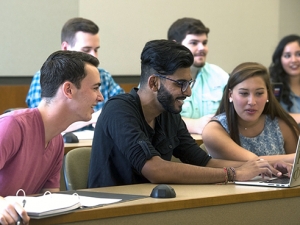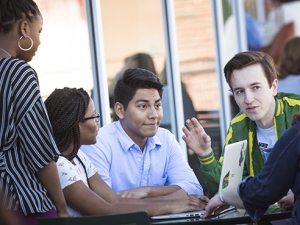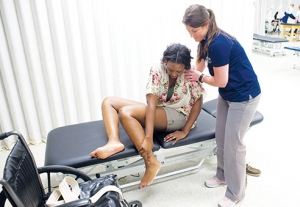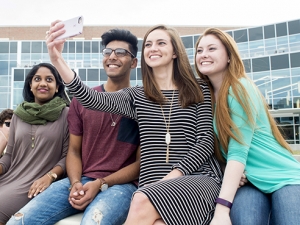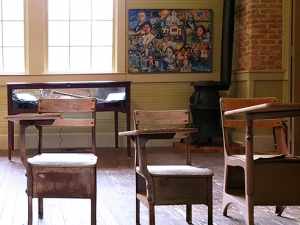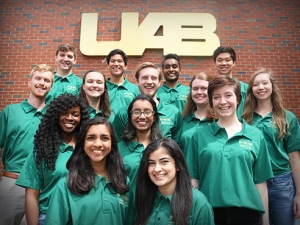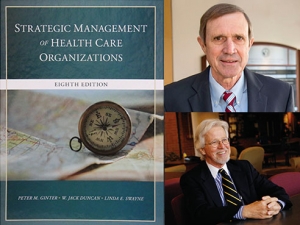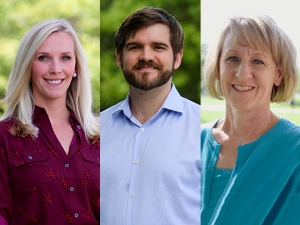 LaVonda Hildreth, senior in respiratory therapy, and Rachael Thompson, junior in civil engineering, say they have gained a broader understanding of their fields by volunteering with community organizations during the summer.Three UAB students say they gained a broader understanding of their field, their futures and themselves by volunteering with community organizations during the summer.
LaVonda Hildreth, senior in respiratory therapy, and Rachael Thompson, junior in civil engineering, say they have gained a broader understanding of their fields by volunteering with community organizations during the summer.Three UAB students say they gained a broader understanding of their field, their futures and themselves by volunteering with community organizations during the summer.
That’s typical, according to Libba Vaughan, coordinator of service learning, who said students often become more invested in social issues or other aspects of scholarship during a service-learning experience.
“These experiences often lead a student down a path where they dig deep into an issue and enhance their critical thinking and problem-solving skills,” Vaughan said. “Students who engage in service and service-learning also tend to stay in school and graduate, they tend to be happier with their college experiences, and they usually are more civically engaged.”
The Office of Service Learning also encourages students to serve with nonprofit organizations outside the university setting to expand their access to knowledge, promote their personal and professional development and provide real benefit to the community, Vaughan said. It helps students find long-term service opportunities through individual sessions or events such as the Service Learning Lunchtime Series, Hunger and Homelessness Week and Campus-Community Speed Matching. “For students who want to try out a short-term volunteer opportunity, the UAB Office of Student Involvement runs a number of great service events throughout the academic year,” Vaughan said.
Faculty recommendations
Taylor Eads and LaVonda Hildreth were directed to their volunteer opportunities by faculty, which Vaughan said is key.
Veronique Zimmerman-Brown, Ph.D., curriculum instructor in the School of Education, recommended Eads get involved in the nine-week program, and “You never tell Dr. Zimmerman-Brown no,” he said.
Eads, a junior in early-childhood education, is thankful for that. He said working with Breakthrough Birmingham this summer provided him with hands-on experience teaching theoretical physics to underprivileged, high-achieving eighth-grade students, and he learned more about the practice of his profession, including ways to write better lesson plans.
“It also furthered my passion to save the talent that slips away because of poor education,” Eads said. “The incredible ability of the children I taught this summer is awe-inspiring.
“The impact this will have on my career as a teacher is huge. I can’t wait to bring the things I’ve learned into my college classes.”
Branching out
Hildreth, a senior in respiratory therapy, who said she is happiest when she is helping someone else, volunteered this summer at the YMCA’s Camp WheezeAway, a three-day camp that teaches kids ages 8-11 to manage their asthma.
“My role was to find fun yet educational ways to cover asthma in a detailed way,” Hildreth said. “It is very important to be thorough and to hold their attention.”
Jerry King, interim director of the Respiratory Therapy program in the School of Health Professions, said students in respiratory therapy are required to volunteer at an asthma camp during their senior year, which is something he and Debra Laken, associate professor in respiratory therapy, organize.
“We realize the importance of giving back to the community through your profession, and we want to give students the opportunity to do that,” King said. “These students have been given the opportunity to become something, and it’s important for them to learn early on that they should be giving back throughout their careers.”
Health-care education became a large part of Hildreth’s experience when she realized the children didn’t know how to properly take their medication or recognize the difference between asthma symptoms and just feeling winded.
“I understood then that more education is needed to eliminate that fear — for the children and their parents,” Hildreth said. “The education the children received could reshape their lifestyle.”
She said she will continue to work with the organization to raise money to send children to camp each year.
“It always is great to give back to the community and remember that someone or some child may benefit from that service for the rest of their life,” Hildreth said. “Improving health-care education starts with me. The impact may be bigger than we ever could imagine.”
| “Volunteering also refined my career goals by helping me hone in on the environmental issues that are important to me, and it solidified my passion to be a part of creating a more sustainable future.” |
Putting knowledge in context
Vaughan encourages faculty to take an active role in guiding students toward volunteer opportunities either within or outside a service-learning course.
“Students who take advantage of these opportunities bring more back to the classroom,” Vaughan said. “Students tend to be more engaged in their academic career after having these experiences.”
Rachael Thompson, a junior in civil engineering, is volunteering with the Alabama Environmental Council on its project to encourage the use of solar energy by providing consumers with information on installation, cost and potential job creation.
“We hope the project will serve as a tool for the state of Alabama,” said Thompson, who is responsible for acquiring, sorting and interpreting data to create a database of solar information.
Thompson, who began working with the AEC in February, said the staff members have become her mentors.
“They have helped me learn that environmental issues can and need to be addressed by all fields, not only those that specifically study the environment; engineers, scientists, medical professionals and business leaders all are affected by issues facing the environment, and, therefore, all can help create a more sustainable lifestyle,” Thompson said.
She met AEC representatives during a Campus-Community Speed Matching event in February and wanted to be part of its initiatives.
“Working with AEC has created a context into which I can incorporate my other engineering classes,” Thompson said. “Volunteering also refined my career goals by helping me hone in on the environmental issues that are important to me, and it solidified my passion to be a part of creating a more sustainable future.”
Information about the Office of Service Learning and its service-learning and volunteer opportunities is online.

